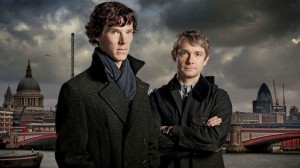Looks like no one is writing about Outnumbered this week, and knowing what the alternative is, that certainly makes sense. We watched the first episode of the BBC’s Sherlock early Monday evening, and I finished the last episode of second series Wednesday afternoon. That’s a hefty nine hours of Sherlock in two days, but the highly lauded series was hard to turn away from for long. The show is fast-paced, featuring witty banter and crude one-liners among its intriguing plot twists and action scenes. It’s gripping and just plain fun to watch. So how does an entertaining show with such high ratings fit into the public service mandate of the BBC? Are the goals of education and entertainment mutually exclusive?
Sherlock appeals to the viewer solely seeking entertainment while also attracting perhaps more sophisticated fans of Sir Arthur Conan Doyle’s classic character. The program works in creative ways to rework plotlines, props, and characters from the original Sherlock Holmes novel series, and spotting these connections brings a level of intellectual entertainment to the table. The first episode portrays a murder mystery which is complex, and the process of solving the case takes intellectual vigor from the characters, and, thus, the audience who must keep up with them. The show also makes great use of London, with much of the action taking place on the distinctive streets and landmarks of the city. These facets of the show, combined with the culturally significant source material, make it one which provides a public service to the people of England. The fact that it is immensely popular only furthers that service, as the common viewing experience contributes to the cultural enrichment of modern society. If people aren’t watching a show which might be more straightforwardly educational, the show makes no public service. To have an effect, programming must actually be viewed in the first place. Sherlock does an impressive job of making itself appealing to a wide fan base.
The success of Sherlock and Guy Ritchie’s Sherlock Holmes films has led CBS to develop its own Sherlock Holmes-based television show, Elementary. In my opinion, this commercialized venture in the American broadcast structure will pale in comparison to the BBC’s take on Holmes. With series three coming out in the summer of 2013 at the earliest, the creators of Sherlock have the luxury to craft their best work, and fans are left wanting more rather than facing saturation over an abundance of episodes. Quality control over three film-like episodes is much higher than a 22-episode season (with ad sales and breaks as an additional requirement). The short series of this show allow for casting of a highly talented actors who might have been too in-demand to commit to 9 months of filming an American-length season. With the stars having the freedom to pursue other projects, they are likely to continue to come back and make time for Sherlock many years into the future. In fact, creator Steven Moffat envisions Sherlock with a presence for decades:
“I fondly imagine it’d be nice to stop it for a while and come back and see what they’re like in their 40s or 50s. Because normally these two characters are portrayed in their 50s. So we’re actually at the beginning. It might be interesting in a couple of decades when they come back and [we] see what they’re like.”
With a show of such popularity, critical acclaim, and ability to “inform, educate, and entertain,” I reckon there will be an audience for such a revisiting.

